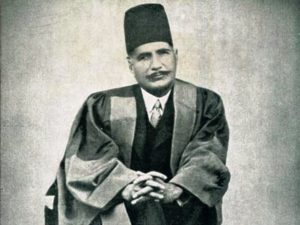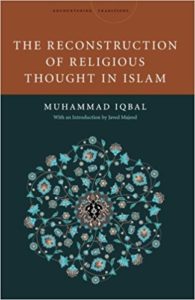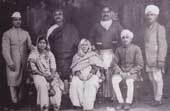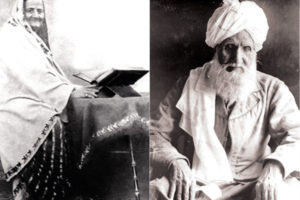A few days ago, on the occasion of Allama Iqbal’s proposed birthday (November 9th was chosen by a committee created in the 1970s), Mr. Rafi, a Pakistani commentator on twiter tweeted that
“Iqbal chose Maududi to head Dar-ul-Islam in Pathankot to reconstruct Islam in a new light and eventually Maududi founded Jamaat-e-Islami (JI) so Iqbal is indirectly a founder of JI as well” (my translation, the original tweet was in Urdu).
Having written extensively on Jamaat-e-Islami and Maududi in the past and with a moderate knowledge of Iqbal’s poetry and prose, I was not thrilled by this simplistic association. In my opinion, it was a tenuous argument and required a bit more nuance and detail. To set the record straight, I went back to some of my source materials and re-read about the relation between Iqbal and Maududi. I wrote a brief blogpost about this issue in April 2012 for Pak Tea House blogzine (May it rest in Peace), which you can access here. Following is a detailed look at interactions between the two gents. (For more, see Vali Nasr’s Mawdudi and the making of Islamic revivalism)
The first time Maududi and Iqbal crossed paths was in the 1927 when Maududi wrote a series of articles on the issue of the concept of Jihad in Islam titled”Islam ka qanun-i Jang” (Islam’s law of war), in twenty-two issues of his magazine Al-Jam’iat beginning in February and ending in May 1927. The articles were well received in Muslim intellectual and political
circles. Mawdudi was lauded for his service to Islam by Muhammad Iqbal;Muhammad Ali; Mawlana Ahmad Sa’id of the Jamiat-i Ulama-i Hind, who wrote a complimentary note about the first installment; and the eminent alim, Sayyid
Sulaiman Nadwi, who saw to the publication in 1930 of the articles in book form under the title Al-Jihad fil-lslam (published by Darul-Musannifin in Azamgarh). The first time Iqbal met Maududi was in 1929 in Hyderabad where he had gone to deliver a lecture.
In 1937, Iqbal wanted to establish a model ‘darul-ulum’ (house of knowledge) in Punjab to lay the foundation for a new Islamic worldview, which would in turn facilitate the creation of a Muslim national homeland. His friend Niyaz Ali, a retired civil servant, wanted to establish a waqf (endowment) using a piece of land he owned in Pathankot, a small town in Punjab.
Iqbal’s aim was evident in his letter to the rector of al-Azhar in Cairo, Shaikh Mustafa al-Maraghi, requesting a director for the intended darul-ulum; Iqbal asked the Egyptian alim for a man who was not only well versed in the religious sciences, but also in English, the natural sciences, economics, and politics. Al-Maraghi answered that he had no suitable candidate. Iqbal was disappointed and handed the task of selecting a suitable overseer to Niyaz Ali, but he remained firm about establishing the darul-ulum.
Niyaz Ali, meanwhile, searched for a suitable administrator for his waqf. He turned first to the famous Deobandi alim, Ashraf Ali Thanwi, but Thanwi rejected the offer. Niyaz Ali then tried to encourage Mawdudi to move to Punjab (Maududi at the time was in the state of Hyderabad working ), though he made him no firm offer and the two disagreed about the aim of the project. Niyaz Ali insisted Mawdudi consult with Thanwi, with whom Mawdudi was at loggerheads, along with the rest of the the Deobandi Jamiat-i-Ulama-i Hind. Disagreements, however, were soon overshadowed by mutual need.
The situation in Hyderabad was fragile, and Mawdudi had come to the conclusion that it was not the best possible place for launching an Islamic revival. This made him more interested in Niyaz Ali’s project, and he solicited
the job of administering the waqf. Unable to find any other suitable candidates, Niyaz Ali was inclined to agree, but the final decision had to await a response from al-Maraghi. Niyaz Ali asked Iqbal to write to Mawdudi and invite
Unable to find any other suitable candidates, Niyaz Ali was inclined to agree, but the final decision had to await a response from al-Maraghi. Niyaz Ali asked Iqbal to write to Mawdudi and invite him to settle in the Punjab. Iqbal arranged for him to come to Lahore and serve as the imam of the Badshahi mosque at a salary of 100 rupees per month and to partake in Iqbal’s plans for the revival of Islam, “umraniat-i Islami ki
tashkil-ijadid” (reconstruction of the social aspects of Islam). Mawdudi turned down Iqbal’s offer on the grounds that he did not want a payingjob that would restrict his freedom. Niyaz Ali then suggested Maududi as overseer of the waqf and secured Iqbal’s agreement to this appointment.
At the meeting , Mawdudi’s appointment was confirmed, but Iqbal did insist that he establish at Pathankot some form of educational institution with a clearly defined curriculum. Mawdudi accepted Iqbal’s scheme and agreed to use the
waqf to train a number of capable Muslim students and young leaders in Islamic law as well as modern subjects. Although the project was essentially educational, the imprint of Maududi’s politics was evident in its name, Darul-Islam (Land of Islam).
All this cooperation was uncharacteristic of the independently minded and self-righteous Maududi, especially since it was clear that by no means had he abandoned his political objectives. Accepting the position was, therefore, partly
out of respect for the celebrated poet and the appeal of being a close associate. Following their meeting with Iqbal, Mawdudi and Niyaz Ali agreed on the terms of Mawdudi’s position as waqf overseer, and Niyaz Ali included Maududi
in the waqf’s governing committee, the Darul-Islam Trust.
Niyaz Ali guaranteed Maududi the autonomy he had asked for, but not the permission to involve himself in political activity, because their agreement with Iqbal regarding the nature of the waqf’s projects precluded it. Mawdudi agreed
to these terms. In the November 1937 edition of the Tarjuman, it was announced that the journal would be moving from Hyderabad to Pathankot; Maududi arrived there on March 16, 1938.
After Iqbal’s death, JI cadres tried to cash in on Iqbal’s brand and called Dar-ul-Islam his brainchild but Maududi himself had a different view. Maududi argued that “the commonality
of views between ‘Allamah Iqbal and me are limited to our belief that Islamic law should underlie the revival of our religion; my thoughts and intellectual probing are my own.” Iqbal did not conceive of the Darul-Islam project as it eventually unfolded, and Maududi was not Iqbal’s choice to lead it. Even after the two met again in 1937, Iqbal’s opinion of Mawdudi was guarded. Mian Muhammad Shafi, Iqbal’s secretary, recollected that he referred to Maududi as
“just a mullah [low-ranking cleric] ,” someone more suited to lead the prayers at the Badshahi mosque than to oversee a pioneering educational project.
Now, in hindsight, did Iqbal’s poetry influenced Maududi and JI’s conception of Islam and the world? It depends on if you want to focus on Iqbal’s more Ummah-focussed poetry and his ideas about mixing of religion and Islam. You would find some overlap in ideas but it is hard to separate the threads in some instances. Whether Iqbal wanted it or not, JI cadres used his poetry for their propagands. But then, such is life.



